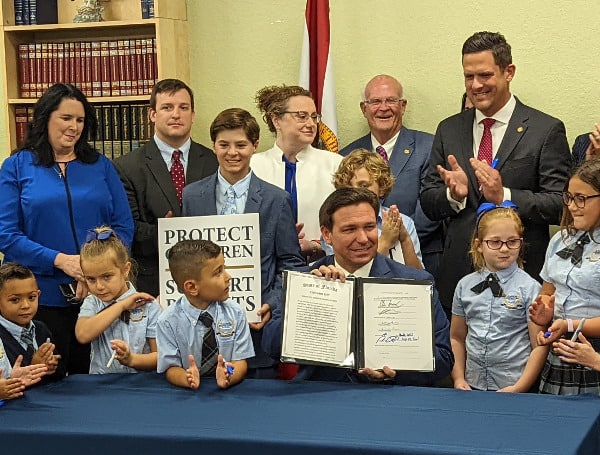Florida education officials are in the process of crafting wording key to carrying out a controversial new law that restricts instruction about sexual orientation and gender identity in public schools, with a workgroup looking to draw ideas from other states.
The law, signed by Gov. Ron DeSantis this spring, prohibits such instruction in kindergarten through third grade “or in a manner that is not age appropriate or developmentally appropriate” for students in higher grades. What is “age appropriate or developmentally appropriate” will be defined by state standards.
The Florida Department of Education formed the workgroup to develop wording that would be included in such standards. The group is made up of school district employees from Hamilton, Marion, Palm Beach and Osceola counties and met for the second time Wednesday.
“The task that we have is to gather as much research and understand the law and to provide a proposed definition,” said Patricia Duncan, senior education manager with the department.
Members of the group discussed crafting separate definitions for the terms “age-appropriate” and “developmentally appropriate.” Kelli Brower, whose LinkedIn profile lists her as a program specialist in Marion County schools, suggested the terms be defined separately.
In the news: For The Lightning, There Is Much To Improve On During Remainder Of Season-Opening Trip
“A child might meet the age, but might not be developmentally mature enough … to handle what is deemed to be age-appropriate,” Brower said.
The law was one of the most-controversial issues during the 2022 legislative session and has drawn court challenges. DeSantis billed the law, titled by legislators as “Parental Rights in Education,” as a way of protecting parents’ rights. Critics disparagingly labeled it the “don’t say gay” law and decried it as potentially harmful to LGBTQ students.
Separately from the workgroup, the State Board of Education next week is slated to consider additions to its Principles of Professional Conduct for educators that could lead to teachers losing their educators’ certificates for violations of the law.
Parents, under the law, also can sue school districts for violations.
The workgroup on Wednesday reviewed wording used in other states, including one paragraph that was used by Oregon’s Behavioral Rehabilitation Services program.
The Oregon guidelines defined “age-appropriate or developmentally-appropriate activities” as part of a broader rule.
The definition said, in part, that such activities are “generally accepted as suitable for children of the same chronological age or level of maturity or that are determined to be developmentally appropriate for a child, based on the development of cognitive, emotional, physical, and behavioral and social capacities that are typical for an age or age group.”
The workgroup took issue with the Oregon rule’s use of the term “generally accepted,” and members discussed instead using similar language that would incorporate the term “research-based.”
The group also reviewed guidelines that were published by Penn State University and the non-profit National Association for the Education of Young Children.
Christopher Combass, director of teaching and learning services for the Hamilton County school district, pointed out that the group is crafting guidelines for a diverse state and millions of students, many of whom come from different cultural backgrounds.
“We’re in North Florida, a small school district. How we perceive things here could be a little different than how someone down the state or in a larger district perceives things,” Combass said.
Duncan, who is leading the group’s meetings, indicated that the group’s work is not likely to be finished next week, when it was originally scheduled to hold a final meeting. Ducan said “more than one” additional meeting likely will be scheduled.
Meanwhile, Jen Cousins, a parent who is among a group of plaintiffs suing several school districts over the law, wrote a public comment in Wednesday’s online meeting.
“Please keep in mind that your definitions here will dramatically impact our LGBTQ+ students, families and educators,” Cousins wrote.
“Yes ma’am, we will,” Duncan replied.
Visit Tampafp.com for Politics, Sports, and National Headlines. Support journalism by clicking here to our GiveSendGo or sign up for our free newsletter by clicking here.
Android Users, Click Here To Download The Free Press App And Never Miss A Story. Follow Us On Facebook Here Or Twitter Here.
Copyright 2022 The Free Press, LLC, tampafp.com. All rights reserved. This material may not be published, broadcast, rewritten, or redistributed.

